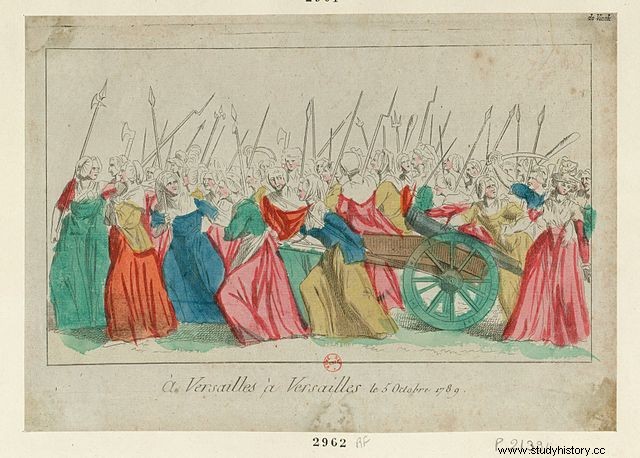Following the failure of the Estates General convened by King Louis XVI in May 1789, the Constituent Assembly swore not to separate before the drafting of a constitution (Oath of the Jeu de Paume, June 20, 1789). In the general enthusiasm, they proclaim the abolition of feudal rights and privileges (August 4, 1789) and prepare the Declaration of the Rights of Man and of the Citizen. The revolution is in place. Indeed, the starving people following a series of food shortages revolt against the power unable to feed them and undermine the monarchy. Also, when a banquet was offered to the regiment returning from Flanders at the Royal Opera of Versailles, the 1 st October 1789, the bloodless people rose up, and on the 4th, a crowd gathered in the gardens of the Palais Royal.
October 5, 1789

Characters
Antoine Barnave
Marie-Louise Chabry
Gilbert Motier de Lafayette
Louis XIV
Stanislas Maillard
Queen Marie Antoinette
Honoré Gabriel Riqueti, aka Count of Mirabeau
Jean-Francois Mounier
Jacques Necker
Procedure
On October 5, 1789, several thousand women headed for Versailles to demand bread from the king. The first procession enters the Assembly and asks to be taken to the king, escorted by the commander of the royal guard La Fayette and 15,000 guards If the interview between the sovereign and Marie-Louise Chabry, the spokesperson of the group, takes place in peace, the second group of women arrives, more vehement La Fayette restores order then goes back to bed, which earned him the nickname of "General Morpheus". Under pressure from the French people and Jean-Joseph Mounier, Louis XVI ratified the Declaration of the Rights of Man and of the Citizen on October 5, 1789. Minister Jacques Necker advised the king not to disperse the rioters. While the monarchy sleeps, the people watch and warm up. The next day, they cross the gates, two guards are killed. It's the riot. The people enter the castle, Marie-Antoinette barely has time to flee through a back door. La Fayette rushes up, calms down and advises the king to appear on the balcony to appease the crowd. The latter asks him to come to Paris, which he cannot decently refuse. The Assembly then met and, at the insistence of the deputies Barnave and Mirabeau, convinced Mounier that the latter follow the king to Paris, the assembly being inseparable from power. This is how a crowd loaded with bread, wheat, made up of more than 30,000 people returned to Paris triumphant, bringing the royal family ironically nicknamed "the baker, his wife and the little baker" to the Tuileries.
Consequences
Now in Paris, the king is at the mercy of the people. The declaration he has just ratified definitively puts an end to the principles of the Old Regime based on birth. It also lays the first foundations of a new society based on the rights and equality of each man, as indicated in its first and most famous article:“Men are born and remain free and equal in rights. These October days which tore the monarch away from Versailles marked the beginning of the slow agony of the monarchy, which would be definitively abolished when the Sans-Culottes came to fetch Louis XVI and the royal family from the Tuileries, on August 10, 1792, for the imprison.
